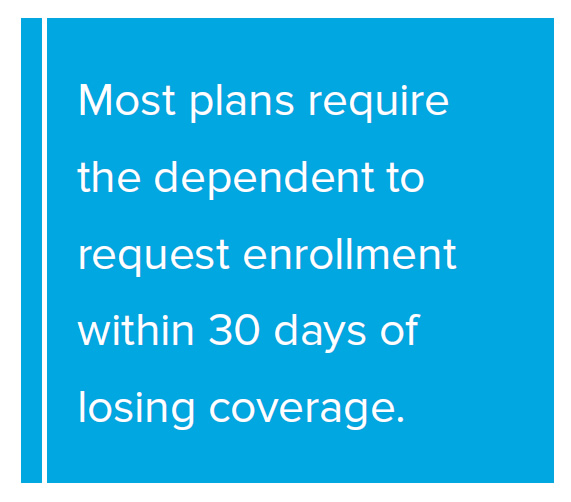Young adults may feel invincible, but it was not long ago that insurance policies could drop their benefits because of their age – leaving many without coverage for accidents, illnesses or even routine health care. Extending dependent coverage to young adults until age 26 was one of the first and most popular parts of the Affordable Care Act (ACA) to take effect. Below are straightforward answers to frequently asked questions about the law’s dependent coverage extension and what parents and their adult children need to know as their children approach their 26th birthday.

A. The law requires private health insurance policies that offer dependent coverage to cover adult children under the age of 26, regardless of their financial dependency on or residency with their parent, student status, employment status or marital status, including major medical insurance and certain excepted benefits such as voluntary insurance. Though the law does not require all plans to offer dependent coverage, if the plan does – that coverage must be extended to young adults up to age 26.
A. Plans are free to choose to extend dependent coverage until the end of the year, but technically the law only requires it to insure dependents up to their 26th birthday. That means that if a dependent turns 26 on July 17, the plan is only required to cover the dependent through July 16. The rules are slightly different for grandfathered plans, which can drop dependent coverage before a dependent’s 26th birthday if the dependent can enroll in an eligible employer-sponsored health plan. Since every health plan is different, employees should check directly with their employer or insurer for the most accurate and helpful information.
A. An adult who is aging out of their parents’ plan may have several options:
 Special enrollment in an employer’s plan: If they are employed and that employer offers health insurance, they may be eligible for a special enrollment through their employer’s plan since this is a life-event trigger. Most plans require the dependent to request enrollment within 30 days of losing coverage.
Special enrollment in an employer’s plan: If they are employed and that employer offers health insurance, they may be eligible for a special enrollment through their employer’s plan since this is a life-event trigger. Most plans require the dependent to request enrollment within 30 days of losing coverage.A. This question requires a two-part answer:
A. Voluntary benefits are also extended to dependents under the age of 26. Though voluntary insurance is not major medical coverage and does not meet the definition of minimum essential coverage under the ACA, these policies pay cash to help cover bills and out-of-pocket costs that may not be covered by major medical insurance.
Regardless of your major medical coverage, voluntary insurance benefits help pay for costs such as deductibles and copays, mortgage and rent payments, groceries and other costs that add up when you are sick or injured. Learn more about voluntary insurance at Aflac.com.
For more information about dependent coverage, please visit:
This material is intended to provide general information about an evolving topic and does not constitute legal, tax or accounting advice regarding any specific situation. Aflac cannot anticipate all the facts that a particular employer or individual will have to consider in their benefits decision-making process. We strongly encourage readers to discuss their HCR situations with their advisors to determine the actions they need to take or to visit healthcare.gov (which may also be contacted at 1-800-318-2596) for additional information.
This article is for informational purposes only and is not intended to be a solicitation. Aflac herein means American Family Life Assurance Company of Columbus and American Family Life Assurance Company of New York.
Z180700
EXP 6/19